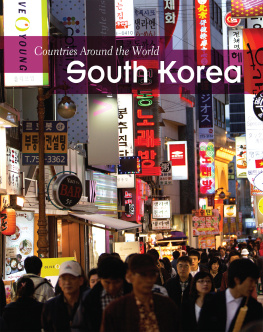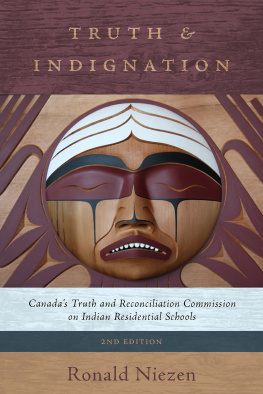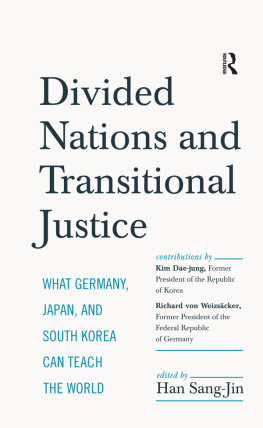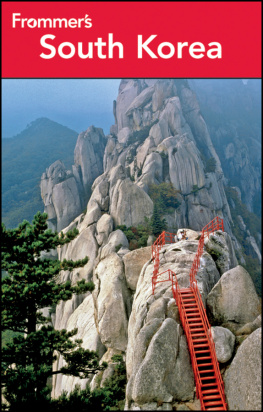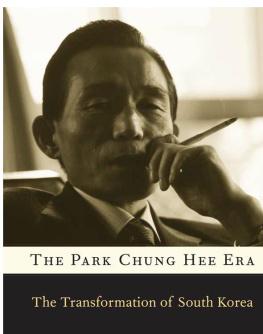Truth and Reconciliation in South Korea
The Korean War is multiple wars. Not only is it a war that began on 25 June 1950, but it is also a conflict rooted in Koreas colonial experiences, postcolonial desires and frustrations, and interventions and partitions imposed by outside forces. In South Korea, the war is a site of contestation: Which war should be remembered and how should it be remembered? The site has been overwhelmed by the Manichean official discourse that pits evil communists against innocent Koreans, but the hegemonic project remains unfinished in the face of the resiliency embodied in the survivors who have withstood multiple killings by the state. The historical significance of the Truth and Reconciliation Commission, Republic of Korea (TRCK), lies in its success in bringing back to life the voices of the silenced that complicate the hegemonic memory of the war as yugio, the June 25th war. At the same time, the Commission embodies a structural dilemma: the effort to give voice to the silenced has turned to the state to redress the states wrongdoings. The TRCK as such stands on the problematic boundary between violence and post-violence, insecurity and security, exception and normalcy. Truth and reconciliation, and human security, are perhaps located in a process of defining and redefining the boundary. This edited volume explores such political struggles for the future reflected in the TRCKs work on the past war that is still present.
The articles in this book were first published
in Critical Asian Studies 42 (1), December 2010.
Jae-Jung Suh, associate professor and director of the Korea Studies Program at The Paul H. Nitze School of Advanced International Studies (SAIS), Johns Hopkins University, is an expert on U.S.Korea relations, U.S. policy toward Asia, international relations of East Asia, international security, and international relations theory. His book and journal publications include Origins of North Koreas Juche (2012), Power, Interest and Identity in Military Alliances (2007), Rethinking Security in East Asia: Identity, Power and Efficiency (coeditor, 2004), and Race to Judge, Rush to Act: The Sinking of the Cheonan and the Politics of National Insecurity (Critical Asian Studies 42:3, 2010).
Truth and Reconciliation in South Korea
Between the Present and Future of the Korean Wars
Edited by
Jae-Jung Suh
First published 2013
by Routledge
2 Park Square, Milton Park, Abingdon, Oxon, OX14 4RN
Simultaneously published in the USA and Canada
by Routledge
711 Third Avenue, New York, NY 10017
Routledge is an imprint of the Taylor & Francis Group, an informa business
2013 BCAS, Inc.
The articles in this book were published in Critical Asian Studies 42 (1), December 2010. Thomas P. Fenton, Editor. The Publisher requests to those authors who may be citing this book to state, also, the bibliographical details of the issue of Critical Asian Studies on which the book is based.
All rights reserved. No part of this book may be reprinted or reproduced or utilised in any form or by any electronic, mechanical, or other means, now known or hereafter invented, including photocopying and recording, or in any information storage or retrieval system, without permission in writing from the publishers.
Trademark notice: Product or corporate names may be trademarks or registered trademarks, and are use only for identification and explanation without intent to infringe.
British Library Cataloguing in Publication Data
A catalogue record for this book is available from the British Library
ISBN13: 978-0-415-62241-7
Publishers Note
The publisher would like to make readers aware that the chapters in this book may be referred to as articles as they are identical to the articles published in the special issue. The publisher accepts responsibility for any inconsistencies that may have arisen in the course of preparing this volume for print.
Charles J. Hanley, a retired Associated Press special correspondent, reported on international issues for more than thirty years. With Sang-hun Choe, Martha Mendoza, and Randy Herschaft, he was part of a Pulitzer Prizewinning AP team that in 1999 confirmed the KoreanWar killing of refugees at No Gun Ri. He is a co-author of The Bridge at No Gun Ri (Henry Holt, 2001). Email: .
Jeon Seung-Hee is a Fellow at the Korea Institute, Harvard University, and a senior editor of Asia: A Magazine of Asian Literature. She received a PhD in comparative literature from Harvard University and a PhD in English literature from Seoul National University. She has published articles on Korean, English, and Asian literature and culture, and she is currently completing a book entitled Representing the Korean War: Trauma, Memories, and Truths. Email: .
Kim Dong-Choon is a professor of sociology at Sung Kong Hoe University in Seoul, Korea. He served the Korean government as a standing commissioner of the Truth and Reconciliation Commission, Republic of Korea. He earned his PhD from Seoul National University (1993). His research focuses on the historical sociology of Korean politics, working-class formation, and the Korean War. In 2004, Hankyoreh (Koreas most progressive newspaper) nominated him as a member of the 100 people who will lead Korean society. His books include Hanguk Sahoe Nodongja Yeongu (A study of Koreas working class), Geun Dae Ui Guneul (Shadow of modernity), and Jeonjang Gwa Sahoe (The unending Korean War). Email: .
Suh Hee-Kyung, a former investigator for the Truth and Reconciliation Commission, Republic of Korea, is research professor at the Institute of Social Science at Sogang University in Seoul. She earned her PhD from Seoul National University (2001); her doctoral dissertation dealt with the controversies related to the National Founding Constitution of the ROK. She is author of A Comparative Study of Constitution Establishment in South and North Korea, 1947 1948: The Birth of Modern State and Constitutionalism, and Two Roads for True Democracy (2007) and The Historical Origins of the 1948 Founding of Constitutional Law in Modern Korea, 18981919 (2006). Email: .
Jae-Jung Suh is associate professor and director of the Korea Studies Program at The Paul H. Nitze School of Advanced International Studies (SAIS), Johns Hopkins University. An expert on U.S.Korea relations, U.S. policy toward Asia, international relations of East Asia, international security, and international relations theory, he has authored and edited numerous journal articles and books, including Power, Interest and Identity in Military Alliances (2007) and (coeditor) Rethinking Security in East Asia: Identity, Power and Efficiency (2004). Email: .
Lisa Yoneyama taught cultural studies and U.S.Japan relations at University of California, San Diego, where she served as a faculty director of the Critical Genders Studies Program. She is author of Hiroshima Traces: Time, Space and the Dialectics of Memory (University of California Press, 1999), Violence, War, Redress: Politics of Multiculturalism (Iwanami Shoten, 2003, in Japanese), and a coeditor of Perilous Memories: Politics of Remembering the Asia-Pacific War(s) (Duke University Press, .
Introduction. Truth and Reconciliation in South Korea: Shadows of War, Colonialism, and Intervention in the Asia Pacific



